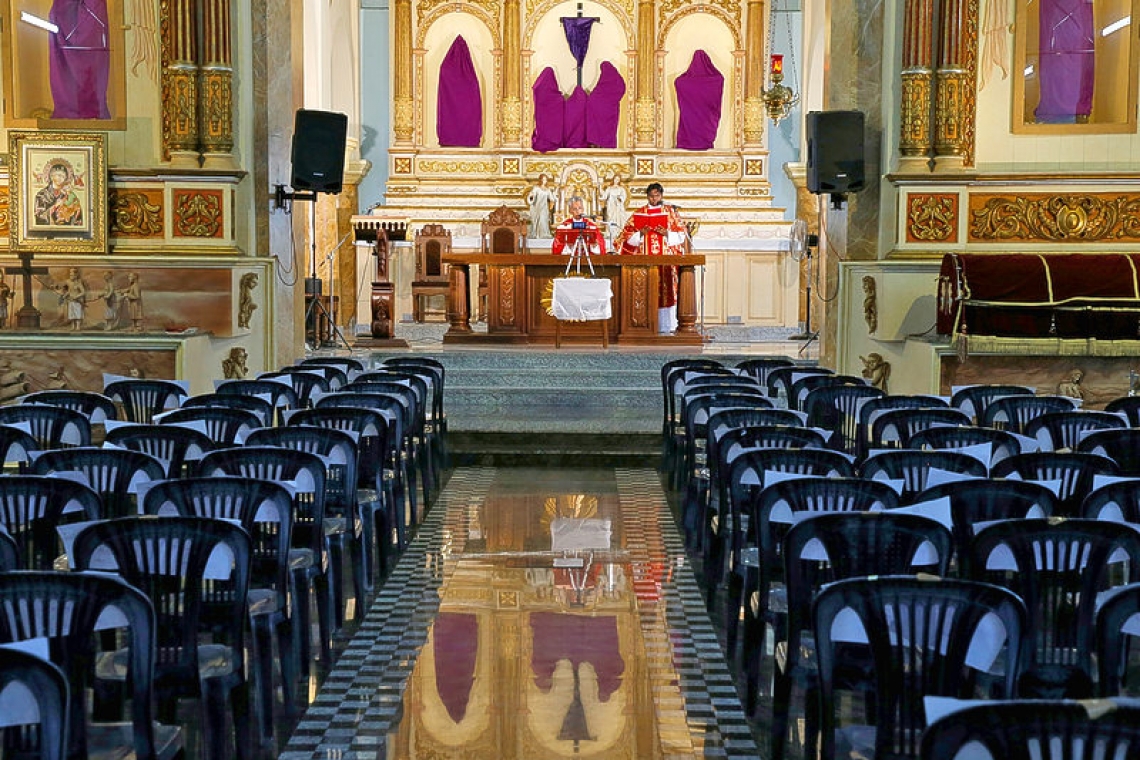Priests conduct prayers in an empty church, broadcasted live for the faithful to slow the spreading of coronavirus disease (COVID-19). The priest taped pictures of his parishioners to empty seats.
VATICAN CITY- - One Catholic priest in rural coastal Ireland delivered socially-distanced blessings from a moving vintage "popemobile".
Another in Germany taped pictures of his parishioners to empty pews and televised his Mass.
With many churches closed or affected by coronavirus lockdown restrictions for the Easter season, Christians of various denominations around the world have come up with novel ways to keep the faith.
Pope Francis, leader of the world's 1.3 billion Roman Catholics, has been, as he put it, "caged" in the Vatican. He has been encouraging his flock via scaled-down Holy Week services transmitted live on television and over the internet.
Most of them have been held in an empty St. Peter's Basilica, which can hold up to 10,000 people, and an empty St. Peter's Square, which has drawn more than 100,000 in past years.
Holy Week - which includes Palm Sunday, Holy Thursday, Good Friday, Holy Saturday and Easter Sunday - is the most solemn period in the Christian liturgical calendar.
"We are celebrating Good Friday, the commemoration of the death of Jesus, under very difficult circumstances," Archbishop Pierbattista Pizzaballa, the Vatican's apostolic administrator in the Holy Land, said outside Jerusalem's Church of the Holy Sepulchre, revered as the site of Jesus' crucifixion, burial and resurrection.
Only a few clerics were allowed inside the church for what otherwise would have been a packed service.
Despite the grim reality of the coronavirus crisis, many pastors have not allowed it to dampen the hope inherent in the Easter message of life triumphing over death.
Since his parishioners couldn't come to him, Irish priest Malachy Conlon geared up - literally - and went to them on Holy Thursday.
He drove an open-top "popemobile" once used by Pope John Paul around northeastern coastal villages, blessing from a safe distance people who gathered on the side of the road as he passed.
"There were huge crowds, it was a moving turnout," he said after the six-hour drive.
"I've never received such a torrent of messages as I have this evening, people deeply appreciative and feeling connected to one another, despite all of the distancing."
On Palm Sunday in the German city of Achern, Father Joachim Giesler pasted pictures of his parishioners on empty pews and said Mass for a few people, including a television crew.
Kerstine Bohnert watched the broadcast with her family.
"Attending church service through TV or online streaming you do have the feeling that you are part of it, we see the priest like we do when we attend church, we see the pictures of others when the camera tilts and recognise other people and we are happy to take part," she said.
It was such a hit with the homebound parishioners that Giesler will do it again on Easter Sunday.
The pandemic has cut across all Christian denominations, creating a sense of unity brought on by crisis.
For nearly 250 years in Winston-Salem, North Carolina, the Easter sunrise service of the Home Moravian church included about 300 musicians playing through the town.
This year, instead of the tradition dating back to 1772, a pastor and a handful of musicians from the Protestant denomination will hold a service broadcast on television and the internet.
"This was a difficult decision to make, and this Easter will be different for all of us," Church elder Reverend.







